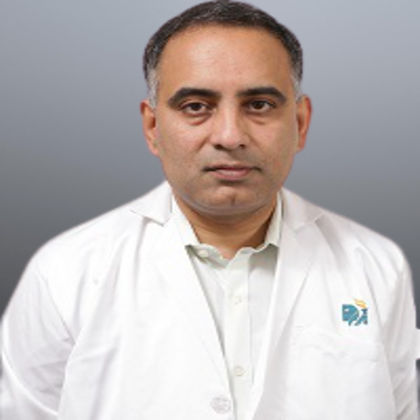Foods Against Cancer
Discover how foods like cruciferous vegetables, fruits, and healthy fats might help fight cancer. Lifestyle changes could also support cancer prevention and overall well-being.

Written by Dr Sonia Bhatt
Last updated on 3rd Jul, 2025
Essential Foods That Fight Against Cancer
Cancer has remained one of the most concerning diseases throughout history and is defined as the uncontrolled growth of cells. Genetics, as well as the environment, strongly influences this disease. However, growing evidence suggests that certain foods can play a significant role in fighting it.
This blog aims to identify foods that help fight cancer, such as cruciferous vegetables and fruits, healthy fats and spices, as well as the lifestyle modifications necessary to prevent its recurrence.
Foods Rich in Antioxidants
Cancer is mainly caused by free radicals, which antioxidants can neutralise. Some of the foods rich in anti-oxidants are:
Berries: Blueberries, strawberries, and blackberries contain anthocyanins and flavonoid compounds that help reduce oxidative stress and inflammation.
Leafy Greens: Spinach, kale, and Swiss chard are packed with carotenoids and vitamin C, which help fight free radicals.
Bell Peppers: These vegetables are packed with vitamin C and beta carotene, which offer tremendous antioxidant protection and help support the immune system.
Nuts and Seeds: Almonds, walnuts, and sunflower seeds contain vitamin E and selenium- two antioxidants that help shield DNA in cells.
Dark Chocolate: It is rich in flavonoids from cocoa bean extracts, and the higher the cocoa solids content (70 per cent and above), the greater its antioxidant properties.
Eggs: These are abundant in antioxidants, lutein, and zeaxanthin, which are especially beneficial for eye health.
Fatty Fish: Salmon contains astaxanthin, an antioxidant that makes the seafood pink in colour. It also has healthy omega-3 fatty acids.
Herbs and Spices: Turmeric, oregano, and cinnamon are high in polyphenols, so a small serving of any product containing these spices provides significant antioxidant benefits.
Whole Grains: Quinoa, brown rice, and oats contain lignan and other antioxidant compounds that are important for cellular health.
Citrus Fruits: Oranges, lemons, and grapefruits contain vitamin C and flavonoids that bolster the body’s immune system and protect cells.
Cruciferous Vegetables
Cruciferous vegetables are well known for their anticancer potential. These are:
Broccoli: Though high in sulforaphane, it is helpful when taken raw or cooked gently under steam to retain its cancer-conquering compounds.
Brussels Sprouts: These are loaded with glucosinolates and Vitamin C, which effectively combat cancer.
Red Cabbage: It combines special chemicals known as anthocyanins, glucosinolates, and vitamin C.
Cauliflower: It supplies indole-3-carbinol, which is involved in modulating estrogen metabolism and preventing breast cancer.
Kale: It provides a strong dose of glucosinolates and antioxidants that benefit the general well-being of the cells.
Bok Choy: It contains peculiar sulfides and has the highest amount of anti-inflammatory chemicals.
Arugula: It contains special glucosinolates that can effectively fight cancer.
Watercress: It contains high amounts of anti-cancer nutrients, especially when taken in a raw form.
Fruits and Berries
Different fruits provide different forms of protection against cancer, including:
Grapes have resveratrol, which has been proven to have anti-cancer properties.
Oranges contain vitamin C and flavonoids that reduce DNA damage.
Pomegranates are packed with punicalagin that is effective in preventing cancer.
Berries combat cancer through multiple powerful mechanisms. They are packed with antioxidants (anthocyanins, flavonoids, and phenolic acids), which counter free radicals in the body and alleviate chronic inflammation.
Blueberries are effective against prostate and colon cancer.
Raspberry prevents the growth of breast and colon cancer cells.
Strawberries protect against the carcinogenic alteration of DNA.
Cranberries have specific effects against bladder cancer through their anti-inflammatory properties.
Whole Grains and Fibre
Whole grains are rich in fibre, which is of great significance in the fight against cancer. Some of the benefits include:
Digestive Health: Whole grains are high in fibre, which accelerates digestion and helps eliminate toxins and carcinogens from the digestive tract.
Microbiome Health: They promote the growth of beneficial gut bacteria, which secrete chemicals that support the immune system and protect the body.
Blood Sugar Regulation: By regulating blood sugar and insulin levels, whole grains help prevent fluctuations and reduce the risk of obesity.
Inflammation Control: Whole grains contain substances that inhibit inflammation, helping to reduce the risk of cancer and protect cells from damage.
Whole grains include brown rice, quinoa, oats, barley, whole wheat, and rye. Eating three to five portions of whole grains, bread, cereals, and pasta every day is advisable.
Healthy Fats and Omega-3
Scientific research has also demonstrated the capability of omega-3 fatty acids to prevent the onset of tumour formation- especially in the breast and prostate. Monounsaturated fatty acids (MUFAs) from plant origin have been found to have a protective role against several types of cancer, and olive oil has significant anti-cancer properties.
Healthy fat intake plays the following roles in cancer prevention:
Fish: Cold-water fish like salmon, mackerel, and tuna are the richest sources of EPA (Eicosapentaenoic Acid) and DHA (Docosahexaenoic Acid). Two servings of three ounces of fish every week fulfil the recommended intake need.
Nuts and Seeds: Plant-derived omega-3 fatty acids are abundant in flax seeds, chia seeds, and walnuts. A single serving of walnuts provides more than 160% of the daily recommended amount of ALA (Alpha-linolenic Acid).
Plant Oils: Flax seed oil, soybean oil, and Canola oil, which are approved for cooking, are good sources of ALA omega-3s.
Edamame: It contains high amounts of omega-3 (around 2.16 grams per 100-gram serving), along with protein and fibre.
Spices and Herbs
Spices and herbs are scientifically known to possess anticancer properties. These natural compounds possess bioactive components that, through various pathways, can combat cancer through cancer cell apoptosis, anti-proliferation effects, and synergism with existing cancer therapies.
Turmeric: Curcumin, the active component of turmeric, promotes an anti-inflammatory and antioxidant action in cancer cells, targeting various signalling pathways.
Garlic: Allicin derived from garlic enhances the immunity system and has specific potential for combating stomach, colon, and prostate cancer.
Ginger: The bioactive compounds gingerol and shogaol found in ginger cause tumour regression, particularly in colorectal cancer.
When used in cooking, through marinades, seasonings, and in fresh preparations, these spices add a burst of taste to the meal but also help in cancer prevention.
Green Tea
Green tea is a potent cancer-fighting drink because of its high content of polyphenols, which comprise catechins. The most effective of these compounds, epigallocatechin gallate (EGCG), has powerful anti-cancer effects, including slowing down the proliferation of cancerous cells, reducing inflammation, and inhibiting metastasis.
Research reveals that moderate intake of green tea is best, and healthy persons should take between three and five cups daily.
Taking five or more cups of green tea daily may help reduce colorectal cancer.
To get the most out of the green tea, it should be brewed for 2-3 mins in water that has a temperature of 175-180 F so that the active ingredients are not destroyed.
Lifestyle and Dietary Habits
In addition to proper nutrition, physical activity may decrease cancer risk through immunity enhancement, hormonal balance maintenance, and inflammation suppression.
Experts recommend at least 150 minutes of moderate-intensity activity or 75 minutes of vigorous-intensity activity per week. This has proven most effective in preventing bladder, breast, colon, endometrial, esophageal, kidney, lung, and stomach cancers.
Conclusion
A proper diet with whole grains, healthy fats, spices, green tea, and an active lifestyle may support cancer prevention by providing nutrients that help inhibit tumour formation and inflammation. Poor nutrition and sedentary lifestyles are associated with increased cancer risk.
Consult Top Oncologists
Consult Top Oncologists

Dr. Tarun Jindal
Uro Oncologist
14 Years • MS (AIIMS, New Delhi), MCh (Gold Medalist), Fellow, VUI, Henry Ford Hospital, Detroit, USA; Robotic and Laparoscopic surgeon
Kolkata
Apollo Multispeciality Hospitals , Kolkata, Kolkata
(100+ Patients)

Dr. Sandeep Muzumder
Radiation Specialist Oncologist
21 Years • MBBS (JIPMER, Pondicherry), MD (AIIMS, New Delhi)
Bhubaneswar
Apollo Hospitals Old Sainik School Road, Bhubaneswar

Dr Nikhil Suresh Ghadyalpatil
Oncologist
18 Years • MBBS, MD (G. Med), DNB (G.Med), MNAMS DM (Medical Oncology - Tata Memorial Hospital) European Certification In Medical Oncology (ECMO) MRCP (Med Onco SCE), PDCR
Hyderabad
Apollo Hospitals Jubilee Hills, Hyderabad

Dr. Raja T
Oncologist
20 Years • MBBS; MD; DM
Chennai
Apollo Hospitals Greams Road, Chennai
(150+ Patients)

Dr. Harsh J Shah
Surgical Oncologist
15 Years • MS, MCh (GI), DrNB (GI)
Ahmedabad
Apollo Hospitals Gandhinagar, Ahmedabad
